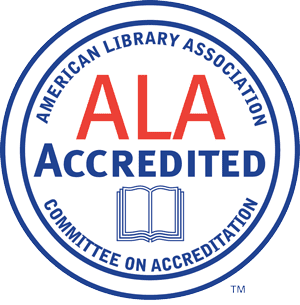
Master of Science in Information Sciences Program Learning Outcomes
It is our vision to provide a quality educational program, and for students to have the very best educational experience possible. By the end of their time in the MSIS program, each student should be able to:

- Describe and discuss the processes of creation, organization, distribution, storage, access, retrieval, management, use, and preservation of information.
- Describe and discuss the nature of leadership and management in the information professions and the importance of participation in the global information society.
- Apply the general principles, values, and ethical standards of providing information services in a variety of settings and for diverse populations.
- Comply with the changing responsibilities of the information professional in a culturally diverse and networked global society.
- Identify critical professional issues in a variety of organizational, cultural, societal, disciplinary, transdisciplinary, and historical contexts.
- Analyze and apply standards or policies related to the processes of creation, organization, distribution, storage, access, retrieval, management, use or preservation of information.
- Explain the changing nature of information, information needs, and information behavior.
- Assess and implement information technologies, systems, sources and services that serve users effectively and efficiently.
- Analyze research and apply it to information practice.
MSIS Student Achievement
The School of Information Sciences engages in ongoing program assessment to continually improve the student experience and ensure that the program is preparing students to be successful in the information professions. We systematically involve students, alumni and prospective employers in this process by conducting periodic surveys and interviews, and by using other data gathering and analysis techniques to understand how we are doing. We engage an advisory board of alumni and other leaders in the information professions who meet annually to review the program, talk with students, and offer input about the current state of the information professions. We collect and analyze student coursework so we can verify if the curriculum has prepared students to demonstrate the MSIS program learning outcomes. We also track retention rates, time to degree completion, and employment in the year following graduation.
Graduation and Retention Rates
Students have a maximum of six years to complete the program. Students may attend full time or part time.
| Calendar Year | Entered the Program | Still Enrolled as of 2024 | Number of Degrees Awarded | Degrees Awarded % | % who entered and completed the program in less than 2 years | % who entered and completed the program in 2 or more years |
| 2016 | 39 | 0 | 34 | 87.18% | 26% | 66.67% |
| 2017 | 93 | 0 | 81 | 87.10% | 44% | 47.31% |
| 2018 | 123 | 0 | 108 | 87.80% | 57% | 46.34% |
| 2019 | 119 | 3 | 101 | 84.87% | 58% | 48.74% |
| 2020 | 140 | 12 | 116 | 82.86% | 65% | 46.43% |
| 2021 | 110 | 32 | 62 | 56.36% | 44% | 40% |
| 2022 | 130 | 100 | 17 | 13.08% | 17% | 13.08% |
| 2023 | 74 | 70 | TBD | TBD | 19% | TBD |
| 2024 | 68 | TBD | TBD | TBD | TBD | TBD |
Time to Degree Completion
Data below indicates the average time taken to complete the 36 credit hour degree program.
| Academic Year | MS Degrees Awarded | Average # of enrolled semesters for graduates |
| 2015-2016 | 64 | 6.58 |
| 2016-2017 | 58 | 6.16 |
| 2017-2018 | 59 | 5.71 |
| 2018-2019 | 59 | 5.46 |
| 2019-2020 | 105 | 5.79 |
| 2020-2021 | 105 | 6.12 |
| 2021-2022 | 130 | 6.20 |
| 2022-2023 | 102 | 6.15 |
| 2023-2024 | 32 | 7.03 |
Employment Rates
Each year, Library Journal (LJ) conducts a placement and salaries survey. All accredited library and information science schools in the US are invited to participate. SIS has been participating for several years by sending a link to LJ’s survey to all students who graduated in the prior calendar year (e.g., in 2022 the invitation went to those who graduate in 2021). LJ publishes a report describing the data and sends participating schools results submitted by their graduates.
The table below shows the number of SIS MSIS graduates who reported they were employed in either a library or information science institution, or in a library or information science capacity but not in a library or information science institution, within the first year of graduating.
| Graduation Year | Number of Graduates | SIS Respondents | ILS Employment |
| 2022 | 120 | 28 (23%) | 27 (96%) |
| 2021 | 106 | 19 (18%) | 19 (100%) |
| 2020 | 103 | 18 (17%) | 12 (71%) |
| 2019 | 83 | 20 (24.1%) | 10 (50%) |
| 2018 | 59 | 26 (44.1%) | 23 (88.5%) |
| 2017 | 56 | 18 (32%) | 16 (89%) |
| 2016 | 63 | 28 (44%) | 24 (86%) |
| 2015 | 73 | 24 (33%) | 22 (92%) |